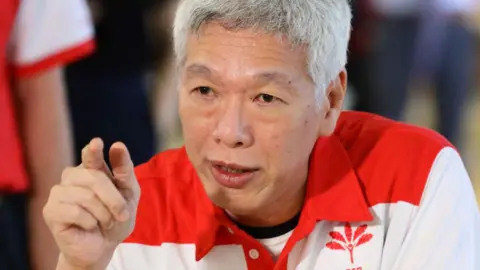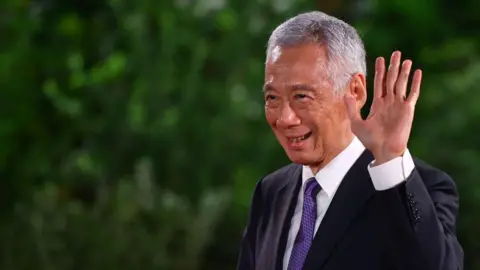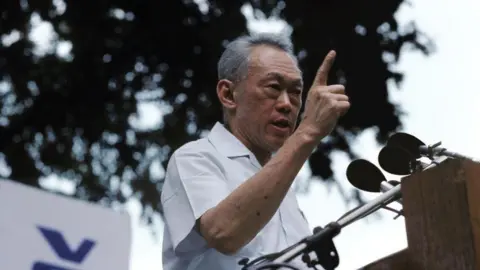 Getty Images
Getty ImagesThe son of modern Singapore’s founder has gained asylum in the UK following claims of persecution amid a high-profile family feud.
Lee Hsien Yang has long alleged he faces oppression back home from the Singapore government that was led for 20 years by his brother, Lee Hsien Loong.
The government denies these claims and says he is free to return.
Both men are sons of the revered leader Lee Kuan Yew who died in 2015. Since then the brothers have been locked in a years-long dispute over their father’s house, which has spiralled into a vicious public family battle.
Lee Hsien Yang showed the BBC some documents including a letter stating his claim for asylum was successful. The letter also stated the UK government had given him “refugee status” for five years as it accepted he had the “well-founded fear of persecution and therefore cannot return to your country Singapore”.
Mr Lee, who lives in London, said his wife had also been granted asylum.
A Home Office spokesman said it is “longstanding government policy that we do not comment on individual cases”.
The BBC has independently confirmed Mr Lee’s asylum status but not other details.
“Everything the Singapore government has said is fully public and must surely have been taken into account when the refugee status was granted,” Mr Lee said.
“I sought asylum protection as a last resort. I remain a Singapore citizen and hope that some day it will become safe to return home.”
As a member of what has been seen as Singapore’s “first family”, and the former chief of Singapore’s largest telecommunications company, Mr Lee was very much a part of the country’s establishment until he fell out with his brother.
Since then he has joined an opposition political party and become a vocal critic of the Singapore government, roles which he has “every intention” of continuing while based in the UK, he said.
 Getty Images
Getty ImagesLee Hsien Yang and his wife, as well as one of their sons, have lived abroad for several years in self-imposed exile. They have been subject to investigations and legal action brought on by the government which they say is part of a pattern of persecution.
Along with his late sister Lee Wei Ling, Mr Lee has long accused their brother Lee Hsien Loong of capitalising on their father’s legacy to build a political dynasty.
They have also alleged their brother abused his power during his time as prime minister, and said they feared he was using the “organs of the state” against them.
Lee Hsien Loong stepped down as PM earlier this year and remains in cabinet as a senior minister. He and the Singapore government have strenuously denied such claims.
On Tuesday the government released a statement saying allegations that Lee Hsien Yang and his family are victims of persecution were “without basis” and that they face “no legal restraints”.
“They are and have always been free to return to Singapore,” the statement added.
Lee Hsien Loong’s press secretary said he had no comment.
 Getty Images
Getty ImagesThe Lees’ years-long dispute over their family home began with the death of Lee Kuan Yew, the country’s first prime minister and widely considered the architect of modern Singapore.
It centres on 38 Oxley Road, a small and nondescript house sitting on a quiet street in Singapore’s downtown that is estimated to be worth tens of millions of Singapore dollars.
The statesman, who was famously averse to the idea of a cult of personality built around him, had stated in his will that he wanted his house to be demolished either after his death or after his daughter moved out of the home.
Lee Hsien Loong, who was prime minister at the time, said the house would be preserved for the time being, while his siblings insisted it should be knocked down immediately in accordance to their father’s wishes.
Following his sister’s death earlier this month from a brain disease, Lee Hsien Yang has now applied for the demolition of the house and, in its place, the construction of a “small private dwelling” that would be owned by the Lee family.





